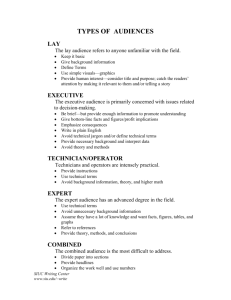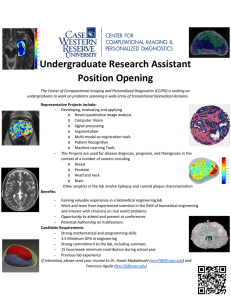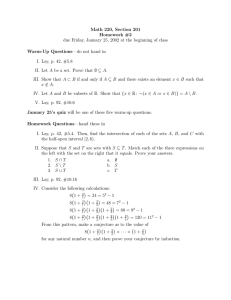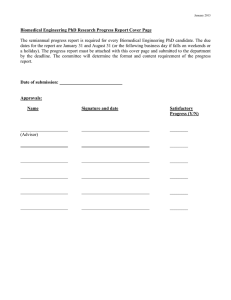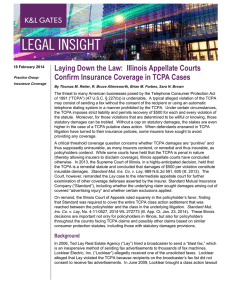why science is opening up Lee-Ann Coleman
advertisement
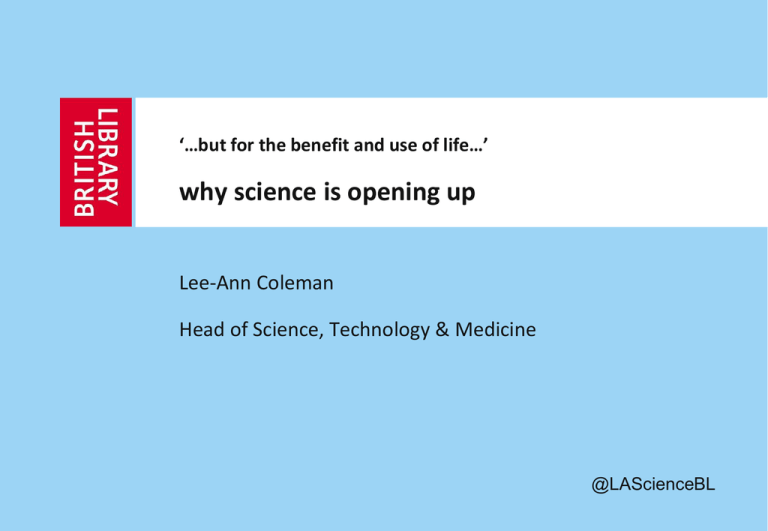
‘…but for the benefit and use of life…’ why science is opening up Lee-Ann Coleman Head of Science, Technology & Medicine @LAScienceBL Our daily bread 2 But what should we be eating? Without being pejorative or elitist, I think that is an issue that we should think about very, very carefully, because there are very few members of the public, and very few people in this room, who would want to read some of this scientific information, and in fact draw wrong conclusions from it. Dr John Jarvis, Managing Director, Wiley Europe (2004) Oral transcript of evidence given to the UK Government’s House of Commons Science & Technology Committee enquiry on Scientific Publishing in 2004 3 Something more nourishing? June 2012 Accessibility, sustainability, excellence: how to expand access to research publications Report of the Working Group on Expanding Access to Published Research Findings – the Finch Group Science as an open enterprise Royal Society report 4 Patients, carers, people! 5 Citizen scientists 6 Active involvement 7 Who needs access? 8 Berlin declaration 2003 'The Internet has fundamentally changed the practical and economic realities of distributing scientific knowledge and cultural heritage. For the first time ever, the Internet now offers the chance to constitute a global and interactive representation of human knowledge, including cultural heritage and the guarantee of worldwide access.‘ 9 Francis Bacon “Lastly, I would address one general admonition to all; that they consider what are the true ends of knowledge, and that they seek it not either for pleasure of the mind, or for contention, or for superiority to others, or for profit, or fame, or power, or any of these inferior things; but for the benefit and use of life; and that they perfect and govern it in charity. (Preface, Inst. Magna: Bacon, IV [1901], 20 f.). 10 Anthony Panizzi ‘I want a poor student to have the same means of indulging his learned curiosity, of following his rational pursuits, of consulting the same authorities, of fathoming the most intricate inquiry as the richest man in the kingdom...’ 11 Enable access to everyone who wants to do research National library of the UK. Serves researchers, business, libraries, education & the general public Collection includes over 2m sound recordings, 5m reports, theses and conference papers, the world’s largest patents collection (c.50m) Collection fills over 600km of shelving and grows at 11km per year 70 Tb of digital material through voluntary deposit The largest document supply service in the world. Secure e-delivery and ‘just in time’ digitisation enables desktop delivery within 2 hours Helping people advance knowledge to enrich lives Science, Technology & Medicine Managing our collections Delivering new content Establishing an evidence base Engaging and inspiring Developing new services Initiating new projects A small core STM team TalkScience@bl.uk WHAT: Evening event series of informal but informed debate on topical issues in contemporary science WHO: High-profile, expert speaker and an informed audience with diverse views WHY: Showcase the Library as a place to engage, entertain and inform those interested in science, technology and medicine Events - Building Partnerships Environmental Science Understanding the sector and its information needs Academia Local Government NGOs and Charities Consultants & SMEs Government Departments & Agencies Demonstrator to improve access and discovery of environmental information • • Search EnviA through external partner websites Trialling GATE text mining technology Improve our understanding of information use Forge partnerships with the environmental science community • MoU with the Living with Environmental Change partnership What access is there to biomedical and health research literature? Does access make it accessible? 20 Patients Participate! A 7-month feasibility study to investigate the possibility of involving patients in the production of lay summaries of biomedical research. A workshop at the Library, found that; • There are barriers for patients who want to access biomedical information • Patients are often overwhelmed by its volume, complexity and technical language • Medical research charities already provide lay summaries - patients would like more • Academics struggle to describe their work in a way that is understood by all ‘The patient with a disease has an acute need for information - your motivation is survival and you want information, yet you face many barriers.’ PP! - Key Recommendations 1. A lay summary for every UKPMC article 2. Guidelines, structures, templates and standards for producing lay summaries 3. Develop evaluation methods 4. Involve patients, the public and researchers 22 Science@BL Thank you to key team members Stephen Andrews Johanna Kieniewicz Anna Kinsey Elizabeth Newbold Allan Sudlow Karen Walshe www.bl.uk/science Follow us on Twitter: ScienceBL or UKPMCUpdates 23

